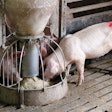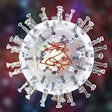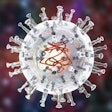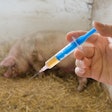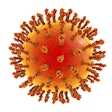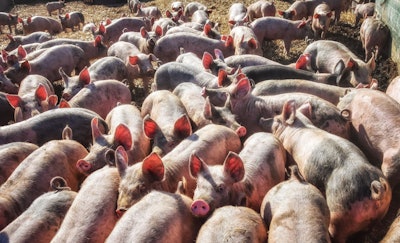
With support from a grant from the U.S. Department of Agriculture (USDA), researchers at the North Carolina State College of Veterinary Medicine will launch the largest study of its kind focusing on the possible spread of porcine epidemic diarrhea virus (PEDv) by contaminated vehicles.
PEDv is a highly infectious microbe that causes severe diarrhea and vomiting in pigs. It has a mortality rate of between 50% and 100% in infected piglets but generally is not fatal in adult hogs.
The NC State team will track vehicles hauling pigs, feed and other materials between swine facilities across Eastern North Carolina, swabbing the trucks and trailers at wash stations for evidence of the virus to assess how effectively these vehicles are being disinfected between stops, according to the school’s website.
“Veterinarians in North Carolina’s swine industry have identified PEDv as a major problem,” says Dr. Juliana Bonin Ferreira, the study’s primary investigator. “PEDv can be spread pretty easily and cause a lot of losses for state and national swine industries, because where we have pigs, we have PEDv. We are trying to help them identify a critical point of transmission and overcome and minimize that spread, which minimizes their economic losses.”
The team on the two-year study — Bonin Ferreira, Machado, forensic scientist Dr. Kelly Meiklejohn and virologists Dr. Barb Sherry and Dr. Michael Rahe, plus their labs’ staff — aims to recommend best practices for disinfecting vehicles between farms and provide an epidemiological model of how other porcine viruses could be transmitted between hog populations.
They were awarded the funding through a USDA program dedicated to preventing the spread of foreign animal diseases, like the extremely contagious African swine fever (ASF), in the United States. ASF has not been recorded domestically but is fatal and has no known treatment or vaccine.
“Essentially, if we can prove that the decontamination protocol of these vehicles is effective for PEDv, it’s likely going to be effective for ASF,” Bonin Ferreira says.
Between October 2023 and May 2024, when infections from the typically seasonal virus are at their peak, team members will swab various parts of the vehicles, including the animal trailer, the tires and the driver’s floorboard, before and after they are disinfected. The group will collect approximately 3,500 samples from 49 vehicles.
As part of the study, researchers are also testing two different vehicle disinfectants in two concentrations each to determine which kills the virus most effectively.






